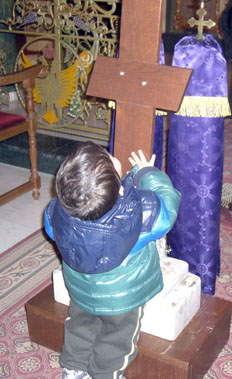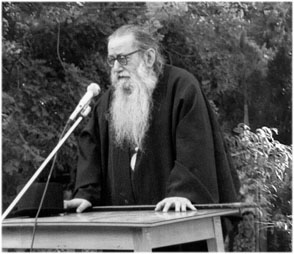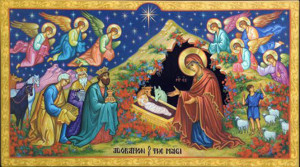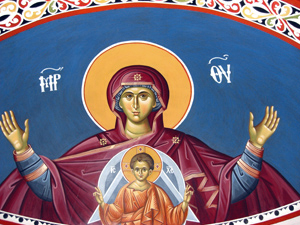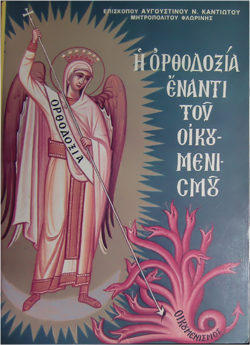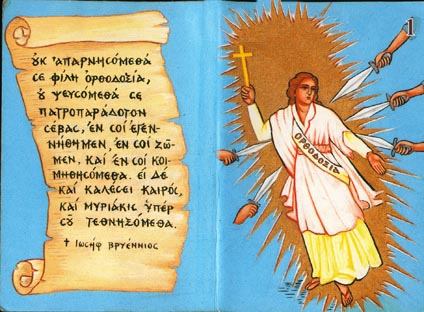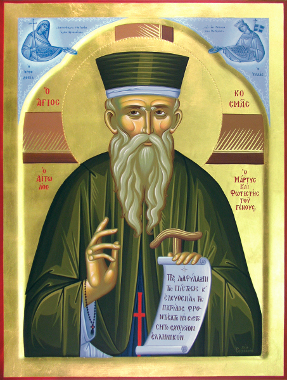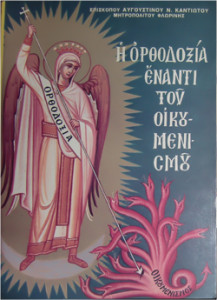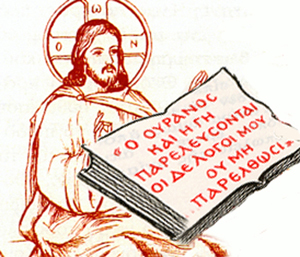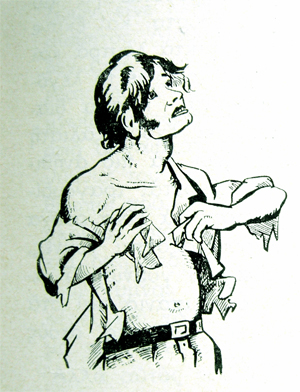ΡΑΣΟ ΚΑΙ ΦΟΥΣΤΑΝΕΛΛΑ
Οι αγωνιστές
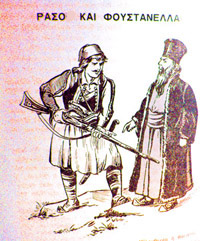 Από τέτοιους κληρικούς, όπως ο Παλαιών Πατρών Γερμανός, από τέτοιους δασκάλους, όπως ο Γεώργιος Γεννάδιος, από τέτοιες προπαντός μητέρες, όπως ήταν οι ηρωίδες του Ζαλόγγου και της Νάουσας, γεννήθηκαν οι αγωνιστές, οι γίγαντες του 1821. Έκλειναν στην καρδιά τους το Χριστό και την Ελλάδα, και γι’ αυτό έψαλλαν με όλη την ψυχή τους το πολεμικό άσμα του 1821·
Από τέτοιους κληρικούς, όπως ο Παλαιών Πατρών Γερμανός, από τέτοιους δασκάλους, όπως ο Γεώργιος Γεννάδιος, από τέτοιες προπαντός μητέρες, όπως ήταν οι ηρωίδες του Ζαλόγγου και της Νάουσας, γεννήθηκαν οι αγωνιστές, οι γίγαντες του 1821. Έκλειναν στην καρδιά τους το Χριστό και την Ελλάδα, και γι’ αυτό έψαλλαν με όλη την ψυχή τους το πολεμικό άσμα του 1821·
«Για του Χριστού την Πίστη την αγία
•και της Πατρίδος την ελευθερία,
•γι’ αυτά τα δύο πολεμώ.
•Κι αν δεν τ’ αποκτήσω,
•τι μ’ ωφελεί να ζήσω;».
Δείτε τις σημαίες των αγωνιστών. Δείτε τα ιερά τους σύμβολα και συνθήματα. Όλα εκπέμπουν πίστη ακράδαντη. Οι Χειμαρριώτες είχαν σημαία, στην οποία είχαν ζωγραφισμένους τους αρχαγγέλους Μιχαήλ και Γαβριήλ με τις πύρινες ρομφαίες. Οι αρματολοί και οι κλέφτες είχαν σημαία, στη μια πλευρά της οποίας ζωγραφιζόταν ο Σταυρός, ενώ στην άλλη η Αρχιστράτηγος, η Υπεραγία Θεοτόκος. Ο Λάμπρος Κατσώνης είχε σημαία με την εικόνα των αγίων Κωνσταντίνου και Ελένης. Ο Μάρκος Μπότσαρης λευκή σημαία με την εικόνα του αγίου Γεωργίου. Ο Παπαφλέσσας ένωσε λωρίδες ράσου και φουστανέλας και έκανε τη σημαία των στρατευμάτων του. Ο Πλαπούτας έ-γραψε στη σημαία τα αρχικά Ι. Χ. Ν. (Ιησούς Χριστός Νικά). Και ο Αθανάσι-ος Διάκος κάτω από το Σταυρό το σύνθημα· ελευθερία ή θάνατος…
Οι Φιλέλληνες
Στην αρχή του ιερού αγώνα όλη η Ευρώπη ήταν δυσμενώς διατεθειμένη εναντίον των Ελλήνων. Αλλά η αυταπάρνηση ανδρών, γυναικών και παιδιών, η οποία ιδίως αποκορυφώθηκε στην πτώση του Μεσολογγίου, έκανε τα έθνη να στρέψουν βλέμματα θαυμασμού προς την μικρή αλλά ένδοξη αυτή Πατρίδα. Και τότε άρχισαν να συρρέουν από όλα τα έθνη άνδρες, οι οποίοι πρόσφεραν ό,τι είχαν, τα χρήματά τους, τις γνώσεις τους, και τέλος θυσίασαν και τη ζωή τους υπέρ της επιτυχίας του αγώνα. Αυτοί είναι οι Φιλέλληνες.
Κορυφαίος μεταξύ των Φιλελλήνων θεωρείται ο λόρδος Βύρων, ο οποίος ήλθε στο Μεσολόγγι και σε ηλικία 36 ετών πέθανε στην αγκαλιά της Ελλάδας, την οποία αγάπησε ως δική του πατρίδα. Οι τελευταίες του λέξεις ήταν·
«Ελλάδα! Σε σένα έδωσα ό,τι μπορεί να δώσει άνθρωπος·
την περιουσία μου, το χρόνο μου, την υγεία μου, τώρα μάλιστα και
την ίδια τη ζωή μου. Είθε η θυσία μου να αποβεί προς ωφέλειά σου».
…Μπροστά μας σήμερα στέκονται η ζωή και ο θάνατος. Η ζωή με το Χριστό· ο θάνατος μακριά από το Χριστό. Ας επιλέξουμε τη ζωή την αθάνατη. Ας γευθούμε την αθάνατη ζωή με λόγια, με έργα και με τα Μυστήρια. Ο Χριστός ας βασιλεύει στην καρδιά μας. Αυτός ας ρυθμίζει την ατομική, την οικογενειακή και εθνική μας ζωή. Αυτός και μόνο ας είναι ο Θεός μας· το όνομά του επικαλούμαστε· εκτός από Αυτόν δεν αναγνωρίζουμε κανέναν άλλο. Εάν προσπέσουμε ενώπιόν του με μετάνοια νινευιτική, εκζητώντας το άπειρο έλεός του, τότε υπάρχει ελπίδα που δεν καταισχύνει ότι η αγαπητή μας Πατρίδα θα εξέλθει από το σκοτάδι σε νέο φως, θα δει καλύτερες ημέρες, και σαν πρωινό αστέρι θα λάμπει και πάλι ανάμεσα στου λαούς Ανατολής και Δύσης!
Apospasma bibliou “ΕΘΝΙΚΑΙ ΕΠΕΤΕΙΟΙ” tou Mitropolitou Avgoustinou Kantioti (Mitropolitοu Florinis)
–
RASO AND FOUSTANELA
The Agonistes – «The Fighters For Greek Independence»
Translated by Constantine George Mourtos, (LTC, US Army, Retired) Nafpaktos, Greece, 30 March 2010
Of such clerics, as Palaion Patron Germanos, of such teachers, as George Gannadios, and, of, particularly such mothers, as the heroines of Zalogou and Naousa, were born the Fighters for Greek independence, the Giants of 1821. Having accepted Christ and Greece in their heart, enabled them to sing with their entire soul the battle hymn of 1821:
«For Christ’s Faith, the Holy,
and our Country’s Freedom,
For these, two, I will Fight,
And, should I not secure them,
What use is to go on living?»
Oh, Say, look at the Battle Banners of the Independence Fighters! See their Holy Symbols and Battle Cries! All, breathe unequivocal Faith! The Himarians had a flag upon which was drawn the Archangels Michael and Gabriel with the fiery furnace (πυρινεs ρομφαιεs?). The Armatoli and Klefts had a flag on whose one side was drawn the image of the Holy Cross, while on the other was drawn the image of the Supreme Commander, the Holiest Theotokos. Lambros Katsonis had a flag on which was drawn the Icon of Saints Constantine and Helen. Markos Botsaris, had a white flag upon which was drawn the image of Saint George. Pappaflesas, joined together strips of the priestly garment «raso», with strips of a foustanela, thusly, creating the battle banner of his army! Plapoutas, wrote on his flag the initial «I.X.N.» ( Jesus Christ Nika – Jesus Christ Conquers). Lastly, Athanasios Diakos, carried a banner with the Holy Cross upon it, and right below was the written the Battle Cry: Liberty or Death!
The Philhellenes
At the beginning of the Holy Fight for Independence, Europe, in its entirety, was disposed against the Greeks. However, the willingness to self-sacrifice exhibited by the Greek men, women, and children, climaxing with their Martyrdom at the fall of Messolonghi, compelled the European Nations to take notice with admiration of this small, but glorious, country. Thus, men from all Nations stepped forth, offering whatever they had; their wealth, their knowledge, and at the end, the very sacrifice of their lives, to insure the success of the struggle. These men, are known as the Philhellenes.
Foremost among the Philhellenes was Lord Byron, who came to Messolonghi to join the Greek Cause, dying at the age of 36; embraced by Greece, whom he loved as his own country. His last words before he died were:
«Greece! To you I gave whatever mankind can give;
my fortune, my time, my health, and now, even my life.
May my sacrifice be proven to be to your benefit».
….Today, we are also presented with a choice of Life or Death. Either Life, with Christ, or, Death, far from Christ. Let us chose Life Eternal. Let us savour Life Eternal through our Words, our Deeds, and through the Mysteries. Let Christ Reign in our hearts. Let Him regulate our individual, family, and national life. Let Him be our Only God-Whose Name we are drawn to-Except for Him we recognize none other. If we kneel before Him, with true repentance, asking for His Boundless Mercy, then there is unrelenting hope that our beloved Country will emerge from the darkness to new light, will realize better days, and, like the Morning star, will, again, shine between the peoples of the East and West!
Excerpt from Metropolitan Augustine Kantioti (Mitropolitan Florinis)
Translated by Constantine George Mourtos, (LTC, US Army, Retired) Nafpaktos, Greece, 30 March 2010
 Posted by: Επίσκοπος on
Posted by: Επίσκοπος on  Ιούν 17th, 2016 |
Ιούν 17th, 2016 |  Filed under: English, ΕΠΙΣΚΕΠΤΕΣ TOY 2012
Filed under: English, ΕΠΙΣΚΕΠΤΕΣ TOY 2012
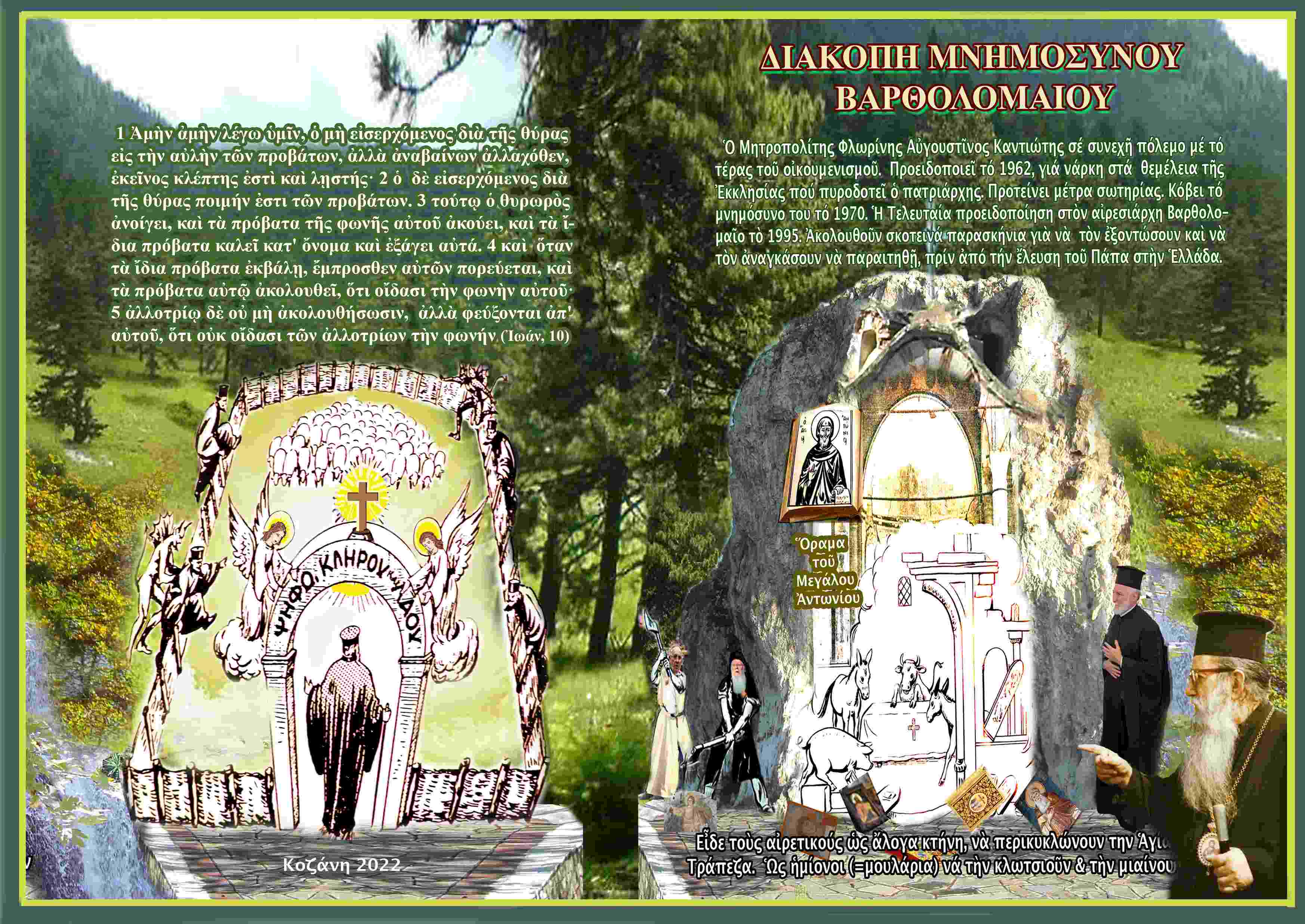

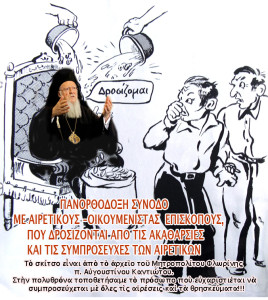
 Be the first!
Be the first! 
